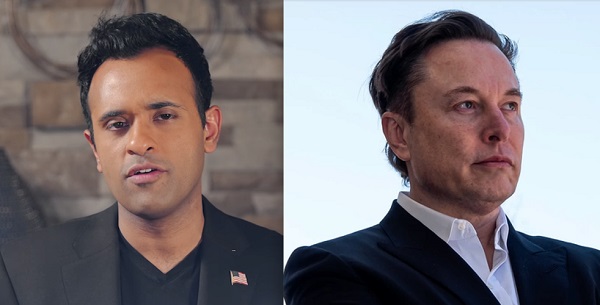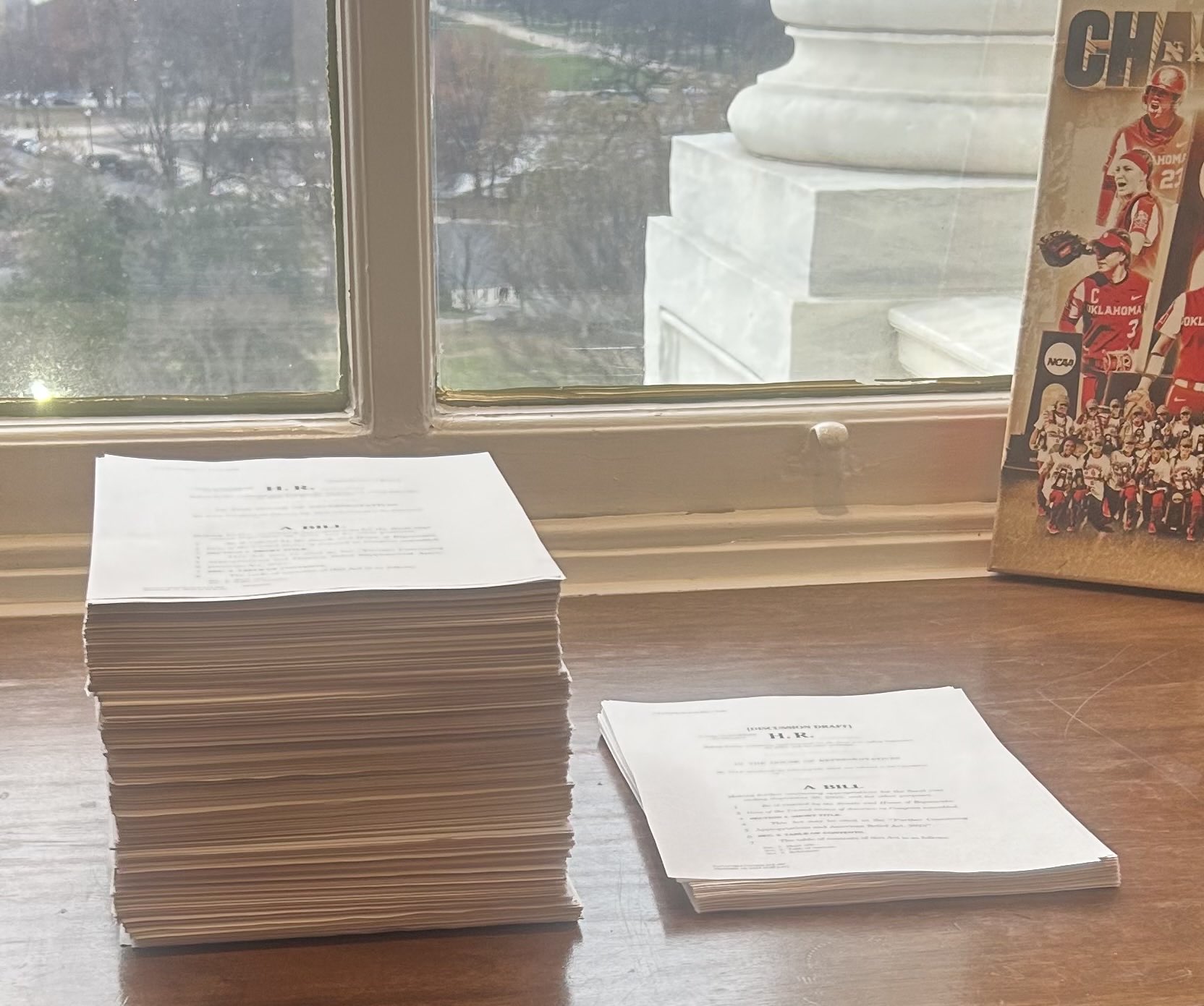Business
DOGE already on the job: How Elon Musk and Vivek Ramaswamy caused the looming government shutdown

Legislators had 24 hours to read through 1,547 pages. Ramaswamy read them. Musk presented an alternative. The process collapsed.
Elon Musk and Vivek Ramaswamy are flexing their muscles even before President Elect Donald Trump’s inauguration, spiking a bipartisan spending bill. The bill was introduced on Tuesday with voting scheduled for Wednesday. Legislators were under massive pressure to approve of the spending bill or risk a government shut down. Problem is, the bill was over 1,500 pages long!
Chances are, the bill would have passed and in the ensuing weeks as details became known the public would have been outraged by all the extra plans to spend / waste taxpayer dollars. Legislators would have apologized by saying they simply had no time to read everything and they were desperate to avoid a shut down.
That’s where the new DOGE comes in. First Ramaswamy somehow read the bill and posted a video to TikTok and X to inform voters what they were going to be paying for in this new bill.
@vivekramaswamy Congress wants to waste your money without telling you, make sure that doesn’t happen
From MXMNews
The newly formed Department of Government Efficiency (DOGE), led by Elon Musk and Vivek Ramaswamy, successfully campaigned to halt the bipartisan continuing resolution (CR) in Congress. Musk and Ramaswamy took to X, rallying conservatives against the 1,547-page stopgap funding measure they argue is riddled with wasteful spending and unnecessary policy provisions.
Musk, a billionaire entrepreneur and vocal advocate for government reform, characterized the bill as a “pork-barrel” monstrosity. “Unless @DOGE ends the careers of deceitful, pork-barrel politicians, the waste and corruption will never stop,” Musk posted on X, adding that lawmakers who support the bill should be “voted out in two years.”
Meanwhile, Ramaswamy, a former Republican presidential candidate and DOGE co-chair, proposed an alternative to the bulky spending bill. Sharing a draft of his one-page resolution, he described it as a minimalist approach that avoids exacerbating historical spending excesses. “This is what a clean CR looks like,” he wrote, emphasizing the need for fiscal restraint.
Musk and Ramaswamy posted this to X.
Shorter = better. This bill is only 116 pages, instead of 1,500+ pages. Took a LOT less time to read. Glad to see the following garbage from yesterday’s bill removed in the current version: – Congressional pay raise/health benefits – 17 miscellaneous commerce bills – Random new pandemic policies, like funding for “biocontainment research laboratories” – Renewal of the “Global Engagement Center,” a key player in the federal censorship state
In record time, the public was informed, politicians were influenced by outraged taxpayers, and politicians blamed each other for a faulty bill and were forced to go back to the drawing board.
It’s all explained very well in this video presentation from Kaizen Asiedu, a Harvard graduate in philosophy who makes videos informing Americans about complicated political matters.
Friday’s deadline to avoid a government shutdown looms. Musk posted on X that a shutdown would be “infinitely better than passing a horrible bill.” His DOGE partner Vivek Ramaswamy urged Americans to contact their representatives to “stop the steal of your tax dollars.”
And President-elect Donald Trump posted this: “If Democrats threaten to shut down the government unless we give them everything they want, then CALL THEIR BLUFF,”.
Should the spending bill fail, it will mark a significant victory for DOGE and a potential turning point in efforts to reform Washington’s spending habits.
Business
It Took Trump To Get Canada Serious About Free Trade With Itself

From the Frontier Centre for Public Policy
By Lee Harding
Trump’s protectionism has jolted Canada into finally beginning to tear down interprovincial trade barriers
The threat of Donald Trump’s tariffs and the potential collapse of North American free trade have prompted Canada to look inward. With international trade under pressure, the country is—at last—taking meaningful steps to improve trade within its borders.
Canada’s Constitution gives provinces control over many key economic levers. While Ottawa manages international trade, the provinces regulate licensing, certification and procurement rules. These fragmented regulations have long acted as internal trade barriers, forcing companies and professionals to navigate duplicate approval processes when operating across provincial lines.
These restrictions increase costs, delay projects and limit job opportunities for businesses and workers. For consumers, they mean higher prices and fewer choices. Economists estimate that these barriers hold back up to $200 billion of Canada’s economy annually, roughly eight per cent of the country’s GDP.
Ironically, it wasn’t until after Canada signed the North American Free Trade Agreement that it began to address domestic trade restrictions. In 1994, the first ministers signed the Agreement on Internal Trade (AIT), committing to equal treatment of bidders on provincial and municipal contracts. Subsequent regional agreements, such as Alberta and British Columbia’s Trade, Investment and Labour Mobility Agreement in 2007, and the New West Partnership that followed, expanded cooperation to include broader credential recognition and enforceable dispute resolution.
In 2017, the Canadian Free Trade Agreement (CFTA) replaced the AIT to streamline trade among provinces and territories. While more ambitious in scope, the CFTA’s effectiveness has been limited by a patchwork of exemptions and slow implementation.
Now, however, Trump’s protectionism has reignited momentum to fix the problem. In recent months, provincial and territorial labour market ministers met with their federal counterpart to strengthen the CFTA. Their goal: to remove longstanding barriers and unlock the full potential of Canada’s internal market.
According to a March 5 CFTA press release, five governments have agreed to eliminate 40 exemptions they previously claimed for themselves. A June 1 deadline has been set to produce an action plan for nationwide mutual recognition of professional credentials. Ministers are also working on the mutual recognition of consumer goods, excluding food, so that if a product is approved for sale in one province, it can be sold anywhere in Canada without added red tape.
Ontario Premier Doug Ford has signalled that his province won’t wait for consensus. Ontario is dropping all its CFTA exemptions, allowing medical professionals to begin practising while awaiting registration with provincial regulators.
Ontario has partnered with Nova Scotia and New Brunswick to implement mutual recognition of goods, services and registered workers. These provinces have also enabled direct-to-consumer alcohol sales, letting individuals purchase alcohol directly from producers for personal consumption.
A joint CFTA statement says other provinces intend to follow suit, except Prince Edward Island and Newfoundland and Labrador.
These developments are long overdue. Confederation happened more than 150 years ago, and prohibition ended more than a century ago, yet Canadians still face barriers when trying to buy a bottle of wine from another province or find work across a provincial line.
Perhaps now, Canada will finally become the economic union it was always meant to be. Few would thank Donald Trump, but without his tariffs, this renewed urgency to break down internal trade barriers might never have emerged.
Lee Harding is a research fellow with the Frontier Centre for Public Policy.
2025 Federal Election
Carney’s budget is worse than Trudeau’s

Liberal Leader Mark Carney is planning to borrow more money than former prime minister Justin Trudeau.
That’s an odd plan for a former banker because the federal government is already spending more on debt interest payments than it spends on health-care transfers to the provinces.
Let’s take a deeper look at Carney’s plan.
Carney says that his government would “spend less, invest more.”
At first glance, that might sound better than the previous decade of massive deficits and increasing debt, but does that sound like a real change?
Because if you open a thesaurus, you’ll find that “spend” and “invest” are synonyms, they mean the same thing.
And Carney’s platform shows it. Carney plans to increase government spending by $130 billion. He plans to increase the federal debt by $225 billion over the next four years. That’s about $100 billion more than Trudeau was planning borrow over the same period, according to the most recent Fall Economic Statement.
Carney is planning to waste $5.6 billion more on debt interest charges than Trudeau. Interest charges already cost taxpayers more than $1 billion per week.
The platform claims that Carney will run a budget surplus in 2028, but that’s nonsense. Because once you include the $48 billion of spending in Carney’s “capital” budget, the tiny surplus disappears, and taxpayers are stuck with more debt.
And that’s despite planning to take even more money from Canadians in years ahead. Carney’s platform shows that his carbon tariff, another carbon tax on Canadians, will cost taxpayers $500 million.
The bottom line is that government spending, no matter what pile it is put into, is just government spending. And when the government spends too much, that means it must borrow more money, and taxpayers have to pay the interest payments on that irresponsible borrowing.
Canadians don’t even believe that Carney can follow through on his watered-down plan. A majority of Canadians are skeptical that Carney will balance the operational budget in three years, according to Leger polling.
All Carney’s plan means for Canadians is more borrowing and higher debt. And taxpayers can’t afford anymore debt.
When the Liberals were first elected the debt was $616 billion. It’s projected to reach almost $1.3 trillion by the end of the year, that means the debt has more than doubled in the last decade.
Every single Canadian’s individual share of the federal debt averages about $30,000.
Interest charges on the debt are costing taxpayers $53.7 billion this year. That’s more than the government takes in GST from Canadians. That means every time you go to the grocery store, fill up your car with gas, or buy almost anything else, all that federal sales tax you pay isn’t being used for anything but paying for the government’s poor financial decisions.
Creative accounting is not the solution to get the government’s fiscal house in order. It’s spending cuts. And Carney even says this.
“The federal government has been spending too much,” said Carney. He then went on to acknowledge the huge spending growth of the government over the last decade and the ballooning of the federal bureaucracy. A serious plan to balance the budget and pay down debt includes cutting spending and slashing bureaucracy.
But the Conservatives aren’t off the hook here either. Conservative Leader Pierre Poilievre has said that he will balance the budget “as soon as possible,” but hasn’t told taxpayers when that is.
More debt today means higher taxes tomorrow. That’s because every dollar borrowed by the federal government must be paid back plus interest. Any party that says it wants to make life more affordable also needs a plan to start paying back the debt.
Taxpayers need a government that will commit to balancing the budget for real and start paying back debt, not one that is continuing to pile on debt and waste billions on interest charges.
-

 2025 Federal Election2 days ago
2025 Federal Election2 days agoTrump Has Driven Canadians Crazy. This Is How Crazy.
-

 2025 Federal Election2 days ago
2025 Federal Election2 days agoThe Anhui Convergence: Chinese United Front Network Surfaces in Australian and Canadian Elections
-

 Automotive1 day ago
Automotive1 day agoHyundai moves SUV production to U.S.
-

 Entertainment2 days ago
Entertainment2 days agoPedro Pascal launches attack on J.K. Rowling over biological sex views
-

 2025 Federal Election1 day ago
2025 Federal Election1 day agoAs PM Poilievre would cancel summer holidays for MP’s so Ottawa can finally get back to work
-

 2025 Federal Election1 day ago
2025 Federal Election1 day agoPoilievre Campaigning To Build A Canadian Economic Fortress
-

 2025 Federal Election2 days ago
2025 Federal Election2 days agoPolls say Canadians will give Trump what he wants, a Carney victory.
-

 2025 Federal Election2 days ago
2025 Federal Election2 days agoCarney Liberals pledge to follow ‘gender-based goals analysis’ in all government policy





